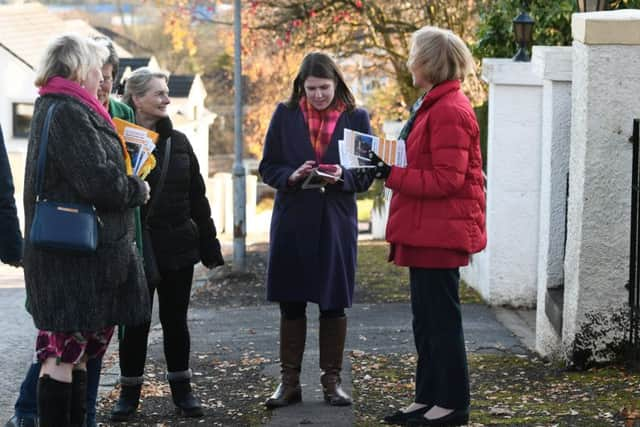My constituents are proud I’m taking on Boris, says Jo Swinson
At least that’s the message from the Liberal Democrats. Jo Swinson, UK party leader since July, is adamant she can take power following next month’s poll.
“It’s an election and everything is possible,” she told Scotland on Sunday. “We are standing in more than 600 seats and we are ambitious for our country.
Advertisement
Hide AdAdvertisement
Hide Ad“We have to be ambitious because the offer from both Boris Johnson and Jeremy Corbyn is so atrocious. I think people are looking for a more positive alternative and that’s the Liberal Democrats.”


First, Swinson must convince voters in these leafy suburbs – centred on the well-off commuter towns of Bearsden and Milngavie – to return her to the Commons for the fourth time. Given her national profile and strong links to the area where she grew up, many would presume her election is a foregone conclusion.
But the Lib Dem leader has tasted defeat here before. In 2015, she lost to the SNP’s John Nicolson – the result of a thumping 16 per cent swing to the Nationalists. She wasn’t out of the Commons for long, however. At the snap poll in 2017, she won back the seat with a solid majority of 5,339.
Two years on, and the SNP is talking up its chances of making gains across Scotland. Swinson, however, is confident her message is resonating at a local level in a seat that decisively rejected both Brexit and Scottish independence.
“I never take anything for granted when it comes to elections,” she said. “The SNP won the seat in 2015 and they do very much want to win it back. I am expecting them to mount a strong challenge. It is very much between them and me for this seat.”
Asked whether voters were most concerned by Brexit or the prospect of another independence referendum, she said: “Both are live issues – and that’s different to 2017 when it was much more about the prospect of an indyref. Now, with where the Brexit process has got to, people are much more concerned about that.
“This is a constituency where around two-thirds of people voted to stay in the UK, and are around three-quarters voted to stay in the EU. It’s very clear that people in East Dunbartonshire want Scotland to stay in the UK and the UK to be in the EU. It’s only the Liberal Democrats that are standing up for that position.”
There is a long tradition of UK party leaders representing Scottish constituencies.
Advertisement
Hide AdAdvertisement
Hide AdGordon Brown was a Fife MP throughout his parliamentary career up to and including his three-year spell as prime minister, while older readers may recall Sir Alec Douglas-Home – the Conservative leader who renounced his peerage in order to gain entry to the Commons via the 1963 Kinross and Western Perthshire by-election.
Swinson’s predecessor, the late Charles Kennedy, was MP for Ross, Skye and Lochaber and the seat’s previous incarnation throughout his time in charge. That seat was won by Ian Blackford, now the SNP’s Westminster leader, in 2015 – and it’s one the Liberals would dearly love to reclaim next month.
“When I speak to people, they understand I now have this national role,” Swinson added. “In a sense, I think they’re quite proud their local MP is taking on Boris Johnson.”
The clarity of the Lib Dems’ pitch to voters is something she believes will see them gain seats north of the Border next month.
“The Tories are pursuing a damaging Brexit that is not going to help Scotland,” she said. “You’ve got Labour – who don’t know where they stand on anything these days – and you’ve got the SNP trying to break up the UK. If you voted to Remain, the SNP’s priority is independence, it’s not stopping Brexit.”
Hoping to achieve what would count as a major political upset is Amy Callaghan, who is standing in her first election for the SNP.
The 27-year-old was inspired by the 2014 independence referendum campaign and joined the party the following year.
Asked if she has a realistic chance of unseating the leader of a UK party, she said: “The short answer is yes. The longer answer is people in East Dunbartonshire are fed-up of having a fly-by-night, pop-up MP who only cares when there is an election on.
Advertisement
Hide AdAdvertisement
Hide Ad“What I have been hearing on the doorstep is people are crying out for a representative who understands the community.”
While the constituency returned a solid No vote in 2014, Callaghan believes more voters are considering independence as a way of out of the “Brexit mess”.
“I would say it’s not just locally, there is a national swing towards independence,” she added. “People are fed-up of being lied to when we have referendums. It happened in 2014, and it happened again in 2016. People did not have a clear picture of what they were voting for.
“What I find disturbing about Jo Swinson’s position is she is prepared to give the people of the UK a second referendum on EU membership – but she won’t do the same for Scottish independence.
“What I’m hearing on the doors in East Dunbartonshire is that people are ready for Scotland’s future to be in Scotland’s hands.”
The last time voters returned a candidate not from either the Lib Dems or SNP was in 2001, when the old Strathkelvin and Bearsden seat was won by Labour’s John Lyons.
Standing for the party in a second successive general election is Callum McNally, 24, from Lenzie. “I am glad Labour is now in a position to campaign for a confirmatory vote on any deal to leave the EU,” he said. “I’m quite happy to go on the record and say I would campaign for Remain at any future referendum.”